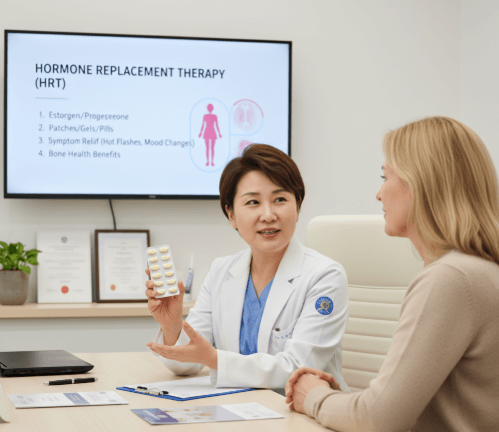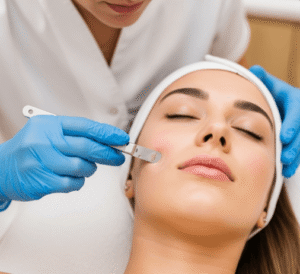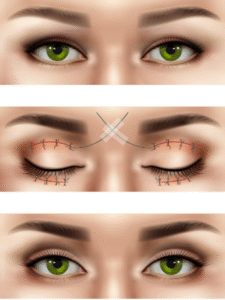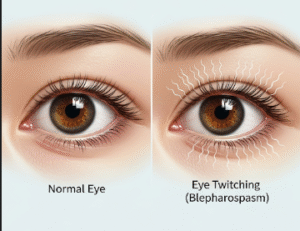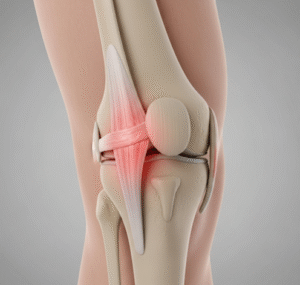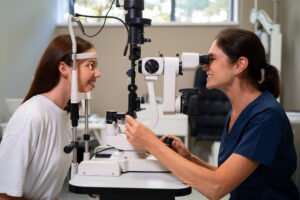What it is
Hormone Replacement Therapy (HRT) is a medical treatment that helps relieve symptoms caused by hormonal decline, particularly during menopause. It involves supplementing the body with estrogen, progesterone, or a combination of hormones.
✔️ Purpose: To reduce menopause-related discomfort such as hot flashes, night sweats, mood swings, and vaginal dryness.
✔️ Forms available in Korea: Pills, skin patches, gels, vaginal rings, and injections.
✔️ Specialized care: Korean gynecology and endocrinology clinics provide personalized HRT plans based on age, medical history, and lifestyle.
➡️ HRT is widely used in Korea as part of women’s midlife health management, often combined with bone health monitoring and cancer screening.
Why it’s done
HRT is prescribed in Korea for several reasons:
🔹 Relief of menopausal symptoms such as hot flashes and insomnia.
🔹 Prevention of osteoporosis by protecting bone density.
🔹 Improvement of mood and mental health by stabilizing hormone levels.
🔹 Better sexual health through reduced vaginal dryness and discomfort.
🔹 Enhanced quality of life for women in perimenopause and postmenopause.
💡 Highlight: HRT is not only about symptom control—it also supports long-term health and wellness in women experiencing hormonal decline.
Alternatives
Women in Korea who cannot or do not want to take HRT may consider alternatives:
➡️ Non-hormonal medications – antidepressants, clonidine, or gabapentin for hot flashes.
➡️ Herbal remedies & supplements – black cohosh, soy isoflavones, or red ginseng (popular in Korea).
➡️ Lifestyle changes – exercise, diet rich in calcium and vitamin D, stress reduction.
➡️ Vaginal moisturizers and lubricants – for dryness and discomfort.
➡️ Acupuncture and traditional Korean medicine – often used as complementary therapies.
⚠️ Note: Alternatives may help mild cases, but women with severe menopausal symptoms or osteoporosis risks often benefit more from HRT.
Preparation
Before starting HRT in Korea, preparation usually includes:
✔️ Comprehensive consultation – reviewing symptoms, medical history, and risk factors.
✔️ Blood tests – hormone levels, liver function, cholesterol, and glucose.
✔️ Breast and pelvic exams – including mammogram and Pap smear.
✔️ Bone density scan (DEXA) – if osteoporosis prevention is a goal.
✔️ Risk assessment – for heart disease, blood clots, or breast cancer.
💡 Tip: Korean doctors emphasize individualized therapy—not all women receive the same type or dose of hormones.
How it’s done
HRT in Korea is personalized and offered in different forms:
- Oral pills → Common, effective, but may affect liver metabolism.
- Transdermal patches or gels → Absorbed through the skin, safer for women with liver issues.
- Vaginal rings, creams, or tablets → Target dryness and urinary symptoms.
- Injections → Less common, but available for specific cases.
Steps in treatment:
- Initial prescription based on symptoms and tests.
- Starting at the lowest effective dose.
- Regular monitoring every 3–6 months for side effects and dosage adjustment.
- Long-term management with annual screenings (breast, uterus, bone density).
💡 Highlight: In Korea, doctors often combine HRT with preventive screenings, ensuring both symptom relief and early disease detection.
Recovery
There is no recovery period since HRT is ongoing therapy, but adjustments may be needed in the first few months.
✔️ Benefits noticed within weeks – reduction in hot flashes, better sleep, improved mood.
✔️ Bone health improvements take longer, often several months.
✔️ Some women may experience side effects such as bloating, breast tenderness, or spotting.
✔️ Most side effects subside as the body adjusts or after dose modification.
When to revisit a doctor:
➡️ Persistent side effects (severe headaches, leg swelling, chest pain).
➡️ New breast lumps or abnormal bleeding.
➡️ No improvement in symptoms after several months.
💡 Important: Regular follow-ups are essential in Korea, where doctors monitor both effectiveness and safety of therapy.
Treatment option in Korea
Korea offers high-quality, advanced, and affordable HRT care:
⭐ University hospitals and women’s clinics specializing in menopause management.
⭐ Comprehensive health packages that combine HRT with cancer screening, bone density testing, and cardiovascular checks.
⭐ Access to both Western hormone therapies and traditional Korean remedies.
⭐ Multilingual medical services in large hospitals for foreign patients.
⭐ Personalized treatment plans to minimize risks and maximize benefits.
💡 Highlight: Korean healthcare integrates modern hormone therapy with preventive screenings, providing women with holistic menopause care.
Key Highlights
✔️ HRT relieves menopause symptoms and prevents osteoporosis.
✔️ Various forms available: pills, patches, gels, vaginal rings, and injections.
✔️ Alternatives exist, including lifestyle changes and traditional Korean medicine.
✔️ Preparation includes full screening (blood tests, mammogram, bone density scan).
✔️ Korean clinics offer advanced, affordable, and personalized HRT care.

